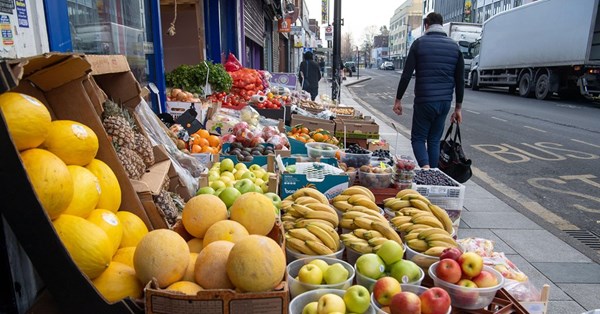THE high cost of fruit and vegetables is contributing to the health gap between rich and poor, a Food Foundation policy briefing on food inequalities concludes.
Britain no longer produces or imports enough for its population to get the government-recommended five portions a day, says the briefing, published this week. More than 80 per cent of the fruit and half the vegetables now come from imports, many from regions increasingly vulnerable to climate change — jeopardising food security by exposure to cost and supply fluctuation.
The briefing, from Sustainable and Healthy Food Systems (SHFS), of which the Food Foundation is a part, suggests that only one in ten children and one third of adults are eating enough fruit and vegetables.
In the year to October 2022, fruit rose in price by more than ten per cent, and vegetables by 15 per cent. Healthier foods, the briefing says, are now nearly three times as expensive as less healthy foods, and consumption was showing strong wealth-related differences even before the cost-of-living crisis.
Key priorities for policy-makers included protecting people on low incomes by expanding schemes such as Free School Meals and Healthy Start, and by ensuring that fruit and vegetables are available from “food desert” convenience stores in areas of high social deprivation.
Boosting domestic supply, so that UK supply chains are not unsustainably dependent on imports from countries likely to experience future climate and water stress, and making better use of cross-departmental working to ensure all taxpayer-funded meals in schools, hospitals, prisons, and government offices include two portions of vegetables, with fruit as an additional portion if used as a dessert, are also recommended.
“As the Government takes forward the development of the Horticulture Strategy for England — which is long overdue — we show it must aim to increase both production and consumption of British fruit and veg. This will make a significant difference to the nation’s health and help our farmers. It’s a win win,” the executive director of the Food Foundation, Anna Taylor, said.
AlamyA Trussell Trust foodbank warehouse at St Margaret the Queen, Streatham, south London, last month
The Christian charity Stewardship reported this week that it had distributed £100,000 since the launch of its Cost of Living Response Fund, two months ago.
Set up to provide support for churches and charities on the front line of helping families in crisis, it has helped to fund and launch the Warm Welcome campaign, which now extends to 4000 churches and community groups. The Stewardship campaign has raised £200,000 to help cover the increased costs of running the warm spaces over the winter.
Its CEO, Stewart McCullough, said that the charity had been “very encouraged” by the generous response. “The need in our communities remains acute; so we will continue to do all that we can to raise and distribute crucial funds for emergency relief, including foodbanks and debt-relief centres, and to help churches and charities keep their doors and warm spaces open.”
Foodbanks continue to be a lifeline to struggling families. Nigel Webster, who runs the Trussell Trust foodbanks based at St Philip’s, on the Top Valley estate in Nottingham, and at St Mary and All Souls, Bulwell, said on Tuesday: “We are experiencing our busiest period in ten years, by far.
“We are 50 percent busier than we were pre-pandemic. It’s really challenging. The good news for us is that we are well supported, and we are able to go into schools again, which helps to generate donations and talk about the issues with young people. That’s been really encouraging.
“But it’s very difficult. We are seeing increased demand, but also pressure on our donors as well, because the cost of living is hitting everybody. There are times when the food just goes flying out of the window — on one afternoon, we can give out a quarter of a ton.” The hard data showed that many people were coming to the food bank for the first time ever, Mr Webster said.
The cost of basic foods has soared. Figures from the Office for National Statistics showed annual food inflation at 16.8 per cent in December. The price of milk topped the list at 46 per cent for low-fat, and 38.5 for whole milk. Bread went up by 20.5 per cent, cheese by 32.6 per cent, eggs by 28.9 per cent, and tinned vegetables by 20.4 per cent.
The Chancellor, Jeremy Hunt, reiterated this week that the Government’s top priority was to bring down inflation.

